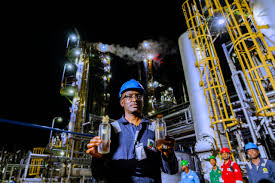Nigeria Hits Refining Milestone: Port Harcourt Refinery Resumes, Boosting Fuel Production To 860,000 BPD
Nigeria Hits Refining Milestone: Port Harcourt Refinery Resumes, Boosting Fuel Production to 860,000 BPD
By: Achimi muktar
LAGOS—A New Era for Nigeria's Energy Independence
In a groundbreaking development, Nigeria’s refining capacity has soared by 67.7% as the Port Harcourt Refinery (PHR) roars back to life. With this revival, the nation’s domestic capacity now stands at an impressive 860,000 barrels per day (bpd), a leap from the previous 650,000 bpd driven by the Dangote Refinery.
For years, Nigeria relied heavily on fuel imports, even as the nation grappled with its paradoxical status as a top crude oil producer unable to meet domestic demand. The reopening of the Port Harcourt Refinery changes the narrative, marking a significant stride toward energy self-sufficiency.
What This Means for Nigerians
At full throttle, the Port Harcourt Refinery and Dangote Refinery are poised to produce 136.7 million liters of petroleum daily—far exceeding the country’s 40 million liters daily consumption. This surplus has the potential to lower costs, stabilize fuel availability, and boost the economy.
Mr. Mele Kyari, the Group Chief Executive Officer of Nigerian National Petroleum Company Limited (NNPCL), heralded the development as “a monumental achievement” at a ceremony marking the refinery’s re-streaming. According to Kyari, this milestone ushers in a new era of energy independence and economic growth. He credited the project’s success to the steadfast support of President Bola Tinubu, who emphasized the urgency of rehabilitating Nigeria’s refining capacity.
Port Harcourt Refinery: A Long-Awaited Return
After years of inactivity, the Port Harcourt Refinery is now refining crude oil and dispatching premium motor spirit (PMS), diesel, and kerosene to markets nationwide. The refinery’s rehabilitation—an Engineering, Procurement, Construction, Installation & Commissioning (EPCIC) project—achieved over 16 million man-hours without a single loss-time injury, a testament to meticulous execution and safety.
Oil marketers, including the Independent Petroleum Marketers Association of Nigeria (IPMAN), expressed cautious optimism about the refinery’s revival. "This is good news for everyone," said Alhaji Abubakar Shettima, IPMAN National President, while emphasizing the need for transparent pricing strategies from the NNPCL.
Future Prospects: Warri and Kaduna Refineries on the Horizon
President Tinubu has directed the NNPCL to expedite the reactivation of other refineries in Warri, Kaduna, and a second Port Harcourt plant. The President acknowledged the foundational efforts of former President Muhammadu Buhari in initiating the rehabilitation of Nigeria's refining infrastructure. Tinubu reaffirmed his administration’s commitment to achieving energy sufficiency and positioning Nigeria as a major player in the global energy market.
A Nation’s Journey Toward Economic Resilience
As the Port Harcourt Refinery ramps up production, stakeholders across various sectors anticipate significant economic benefits. The Nigeria Union of Petroleum and Natural Gas Workers (NUPENG) praised the milestone as a critical step toward reducing energy-related hardships and stabilizing the economy.
Meanwhile, the Petroleum Products Retail Outlets Owners Association of Nigeria (PETROAN) expressed optimism about job creation and increased competition in the downstream sector. “This refinery is a game-changer,” said Dr. Joseph Obele, PETROAN's spokesperson, noting its potential to drive down fuel prices and boost economic activities.
Transparency and Accountability in Focus
The Labour Party has called for greater transparency in managing Nigeria’s petroleum sector, urging the government to ensure accountability in public spending on refinery rehabilitation.
A Historic Evolution
Since its inception in 1965, the Port Harcourt Refinery has been a cornerstone of Nigeria’s oil and gas sector. Despite setbacks, the latest rehabilitation signifies a renewed commitment to optimizing the country’s refining capabilities. Experts are hopeful that sustained efforts will place Nigeria among the leading nations in energy production and export.
This monumental achievement is not just a triumph for the NNPCL but a beacon of hope for a nation striving to reclaim its position as an energy powerhouse.






















